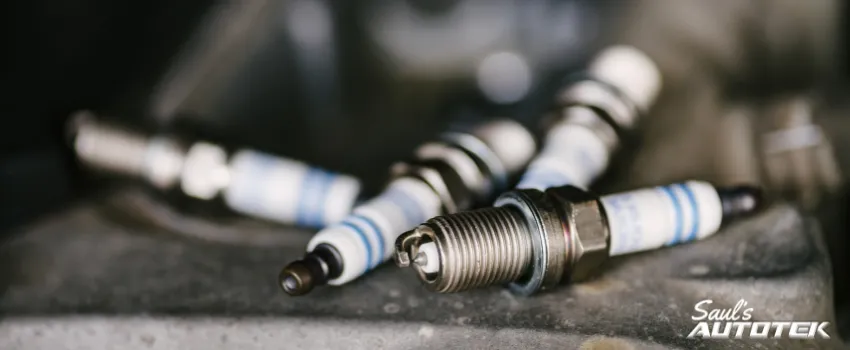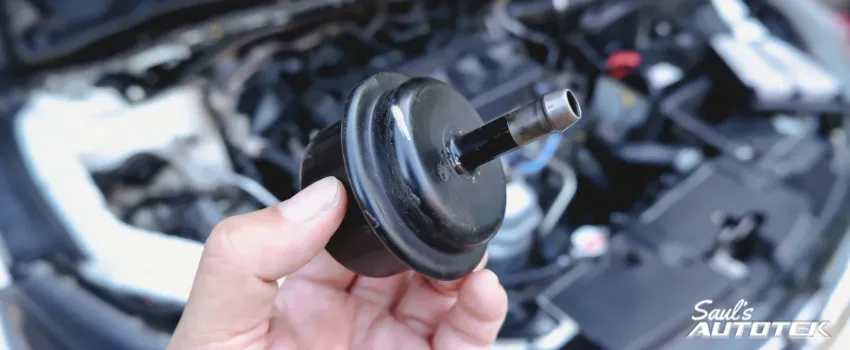Hi there. I’m Saul Reisman here at Saul’s Autotek, and today we’re standing in front of this Jeep Wrangler to talk about a commonality problem that we’ve seen in the industry for years.
Now, you’ve heard us make videos before about Jeeps and their death wobble problems, and our fixes to keep them back on the road. However, the reason we’re revisiting this topic is that today, FCA ( Fiat Chrysler of America ) announced, not a recall, not an update, but what they call a technical service bulletin or TSB. Now, a TSB means that they wrote a memo and they sent it to all their dealerships and told them,
“If you see this (Jeep Death Wobble) problem, this is how you solve it.”
Now, the reason that it’s been made as a technical service bulletin rather than a recall is that FCA does not think your death wobble problem involves your safety. I’m going to say that one more time. FCA does not think that your Jeep death wobble problem is a safety concern. Now, with a name like “death wobble“, and with an inability to steer or stop the vehicle when it happens, I think that’s a safety concern. And I’m going to keep addressing these, and I’m going to keep fixing these.
When we saw this TSB come across our desk today, because we’re in the same dealership network, so even though we’re not a dealership, we get the same memo that every dealer does, for every update, we saw that all they’re doing is putting a Band-Aid on a broken leg. FCA knows for a fact that the design of that vehicle has a resonant harmonic frequency that gets struck at approximately 58 miles per hour, that will create the death wobble effect. They’re not changing the design of the Jeep. They’re not putting different parts on it. They’re not doing anything to improve your safety. They’re not changing that harmonic. They’re not putting a different axle in it. They’re putting a shock absorber that they call the steering stabilizer on the front of the vehicle.
Now, the way these vehicles are designed from the factory, we have a crossover steering, meaning the steering componentry from the frame rail of the steering gearbox, will steer the passenger wheel, and then has a link that drags the driver’s wheel with it. Now, the reason that they build this crossover steering is that the height difference from the top to the bottom is too steep of an angle to try and push side to side. As a result, we use this crossover design. On some old Jeep Wranglers, you’ll see it mounted to the middle of the arm. On some newer Jeep Wranglers, you’ll see it mounted directly to the knuckle. The reality is both of these systems were designed so that the passenger tire gets all the force and the driver’s tire gets dragged along for the ride.
When the harmonic hits and the death wobble occurs, there is nothing that will stop it, other than getting away from that harmonic frequency.
That frequency will resonate as long as the vehicle is moving. Just like if you’re riding a bicycle and the bike will keep going if you jump off, because the wheels are rotating and creating a gyroscopic effect of the wheel, as long as the vehicle is still in motion and the wheels are still rotating, the harmonic frequency will continue to occur, and the death wobble will continue to happen.
Not only will the wobble create an inability for you to steer or stop your vehicle potentially, but it will do serious, irreparable damage to the ball joints, the U-joints, the inter-axial seals, the tie rods, including, but of course not limited, to that steering stabilizer. Now, that shock absorber that they reference as a steering stabilizer? Let’s think about the term “steering stabilizer”. Well, steering, because it’s mounted to the steering. It’s not part of the suspension. Stabilizer: it’s designed to create stability. Well, why, if the vehicle is inherently so unstable, will we just put a bigger stabilizer on it? Why wouldn’t we stop what makes it unstable?
Now, FCA doesn’t care. So FCA issued a technical service bulletin that says if you come in with a Jeep, and you say it’s got death wobble and you’re angry and you want them to fix it, that all they need to do is remove two bolts, remove that stabilizer, throw it away, and put on a new one that’s a little bit thicker.
Now, the reason it’s a little thicker is it holds a little bit more fluid. And what that means is when the front of your Jeep is smashing side to side shaking itself, it has a little bit more resistance from that shock absorber to stop that from happening.
Now, the reason I say this is a Band-Aid is that a Band-Aid on a broken leg isn’t going to fix the problem. It might look better. You might even feel better. We see it: the placebo effect. We see it there. We think it’s better. The leg is still broken. Putting a Band-Aid on it because it’s bleeding a little bit isn’t going to fix the bones. Putting a stabilizer on something that is inherently unstable, will just make it a little bit better.
One common issue that I’ve seen in my 10 years of experience working with Jeep death wobble vehicles on the 25,000 of them that I’ve solved, is the fact that most owners will go to multiple auto repair facilities before they find us. Once they find us, we solve it, we cure it, and that’s what we’re here to do for you, but the reality is most auto repair shops don’t see this every day.
Most auto repair shops will see what’s going on, and recommend a steering stabilizer. If I could count how many times I’ve brought a vehicle into my facility and was told by the owner, “It’s got death wobble. It doesn’t need a steering stabilizer. We just put a brand new one on.” And I will bring the owner in and show them that their new stabilizer is already leaking and deteriorating and failing. And they go, “I don’t understand. I put the stabilizer on; the death wobble went away. Why is that new part failing?” Well, the reason it’s failing is because it is that Band-Aid on a broken leg. It is that Band-Aid on a broken leg. As a result, it’s designed to take a little bit of that abuse.
That’d be like me telling you, “I want you to run 100 miles today, but I know your feet are going to be sore, so I’m going to put a marshmallow in each of your shoes.” And you would look at me and say, “That’s crazy, Saul. That’s not going to change anything.” And I would say, “It’ll make it a little bit softer.” And when you hit that resonance of smacking into the ground and you feel that impact go into your entire body, your ankle, your knee, your hip, into your lower back, your kidneys, where you feel it after running all day, I would look at you and say, “That marshmallow made it a little easier. It felt a little softer. Wasn’t that better?” Well, if you’ve got a Jeep, that’s what Fiat is telling you right now.
Fiat Chrysler America is telling you that they want to put a marshmallow in your shoe and tell you to keep running because it’s going to make it softer. The reality is putting a larger steering stabilizer on the vehicle is going to mask the problem. It’s going to continue to deteriorate, and it’s going to destroy that new steering stabilizer. Those steering stabilizers are cheap. The factory ones are $50 to $100. The new replacement ones are only about $95.
Why would they want to put such a cheap part on this? Because they put a cheap part as a replacement, it saves FCA money. Well, isn’t that what we care about? Saving FCA money? No one cares about your safety other than us. FCA obviously just cares about making a dollar. They actually issued in their statement saying that they’ll never issue a recall for this because it’s an engineering and manufacturing combined failure.
It’s not that they manufactured the part wrong or it’s defective, and it’s not that they engineered it wrong and made it wrong, but it’s a combination of the two. But they refuse to take ownership.
Here at Saul’s Autotek, we take ownership. You have a death wobble, I’m going to guarantee for life that it’s never going to fail. If it does, we’re going to replace it, repair it, or we’re going to give you your money back. So rather than go to the dealership and have them go through a Band-Aid on your broken leg because you’ve had death wobble, it’s been unsolvable, and you think now that the dealership’s going to do that, it’s going to make your day better, call me in 60 days. Tell me how it goes after you have that repair done. I would love to inspect your vehicle for free, and I would love to go on a test drive with you.
I want to ride around the block with you and your Jeep, pull your vehicle into our facility, and put an infrared temperature thermometer on that steering stabilizer so I can show you from a physics perspective that the oscillatory harmonic frequency that’s resonating in the front end of your vehicle is being transferred from kinetic energy into thermal energy, which is then being dissipated by the fluid in that stabilizer. Will that help for a little bit? Of course. Is the answer to a heat solution just to give it a little bit more volume? Absolutely not.
Now, I majored in physics. It’s what I studied and got my degree in, and I applied that knowledge to build the repair system for your death wobble cure kit. That’s why I guarantee it. FCA issued a technical service bulletin, because it’s not a cure. It’s something that they’re telling the dealerships to do when you complain, so that when they hear your complaint, they know what to say to you because they hear so many complaints about the same problem.
Now, in their technical service bulletin, FCA cited a very specific number: 370,000. 370,000 Jeep Wranglers were delivered in June of 2019, and only two percent of owners have complained, and FCA has made a public statement about that two percent number. Let’s break that down. Two percent, 370,000 … 7,400 a day. Wow. 7,400 a month, 250 a day, 24 hours in a day. But most people are asleep for about eight of those, so 16 hours, 250 calls, 250 complaints. So you’re telling me that every six minutes somebody files a formal complaint with FCA or the National Highway Transportation Safety Administration about this.
Now, this doesn’t mean somebody went to their shop and got told it’s got death wobble and they need to fix it and they just went home angry. This doesn’t mean somebody went to the dealership and said they’ve got death wobble in the dealership said, “Here’s a Band-Aid.” This is how many people took the time out of their day to go above and beyond and try and protect the safety of other consumers like you, and make sure that other people are aware of this problem so that they don’t end up in the same boat as those current people, because they’re not happy with the feelings they’re experiencing.
Every six minutes. However, FCA and the NHTSA, they can only take complaints Monday through Friday during banker’s hours and nine to five. That’s why here at Saul’s Autotek we’re open 365 days a year from 6:45 in the morning to 6:00 in the evening, because we’re always here to listen to what you have to say. We value your safety. We want to keep you reliable and consistent. And most importantly, we want you confident in your vehicle, in your repairs, and in your mechanic.
We want you to know that we’re going to prioritize your safety no matter what. We want you to know that we’re going to provide a cure to the problem and not a bandaid. And we want you to know that anytime that somebody tries to tell you there’s a bandaid solution and we know they’re not doing the right thing, we’re going to put it on blast and we’re going to let them know.
You might see in this video, but we’ve tagged FCA. We want them to be aware that we recognize what they’re doing, but that we care deeply about these Jeep owners because we want them to enjoy their vehicles. If you’ve got concerns about your Jeep Wrangler, its death wobble issues, or you’re looking at buying one and you’re scared because of what you’ve seen and heard, come and see us here at Saul’s Autotek.
I’d be happy to go through the one you have now, show you one we’ve got, and give you some knowledge and expertise on how you can prevent such failures in the future and coach you into the best repair plan to save you money, save you time, and keep you on the road. Seven days a week, 365 days a year here in Greenwood Village, Colorado. Let’s take a look at your Jeep and see what’s next.
Give us a call here at Saul’s at (303) 919-7769. Stay smooth.
Schedule Your FREE diagnostic Subaru Outback Auto Repair Upkeep and Repair Appointment
Check out Our Reviews On Yelp! And Leave A Great One For Us!
Join Our Conversation on Facebook
Explore Our Exceptional Denver Auto Repair Services
- Brake Repair Service
- Suspension Repair
- Steering Repair
- Engine Repair
- Automotive Air Conditioning and Heating Repair





